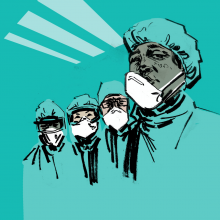
The Phased Approach to COVID-19 Mental Health Response (PAC) is a framework for COVID-19 mental health response developed by ADAA members Drs. Sheila Rauch, Naomi Simon, and Barbara Rothbaum to aid in responding to and planning for mental health impacts of the current pandemic. The framework attempts to provide key directions on the required response over time as this will likely be an ongoing stressor for coming months and across the wide range and severity of impact. The framework aims to concisely summarize points for program design and point to available protocols and resources when available. For specific areas where previous resources have not been specified, they relied on evidence informed practice to create brief interventions (mask desensitization, self-directed difficult experience exposure, and assessment protocol with brief intervention for a MH provider). The authors intend that this framework will be updated as we learn more about COVID-19 mental health response and new resources become available.
Additional Research
- Phased Approach for Supporting the Mental Health of Healthcare Workers and Others Affected by the COVID-19 Pandemic (PAC)The Phased Approach to COVID-19 Mental Health Response (PAC) is a framework for COVID-19 mental health response developed by ADAA members Drs. Sheila Rauch, Naomi Simon, and Barbara Rothbaum to aid in responding to and planning for mental health impacts of the current pandemic. The framework attempts to provide key directions on the required response over time as this will likely be an ongoing stressor for coming months and across the wide range and severity of impact. The framework aims to concisely summarize points for program design and point to available protocols and resources when available. For specific areas where previous resources have not been specified, they relied on evidence informed practice to create brief interventions (mask desensitization, self-directed difficult experience exposure, and assessment protocol with brief intervention for a MH provider). The authors intend that this framework will be updated as we learn more about COVID-19 mental health response and new resources become available.
- Intensive Outpatient Prolonged Exposure for PTSD in Post-9/11 Veterans and Service-Members: Program Structure and Preliminary Outcomes of the Emory Healthcare Veterans Program, Trauma Psychology News, Winter 2017, Carly Yasinski, PhD, Andrew M. Sherrill, PhD, (ADAA member) Jessica L. Maples-Keller, PhD, (ADAA board member) Sheila A.M. Rauch, PhD ABPP, and (ADAA member) Barbara O. Rothbaum PhD ABPP - Department of Psychiatry and Behavioral Sciences Emory University School of Medicine
- Intensive Treatment Models to Address Posttraumatic Stress Among Post-9/11 Warriors: The Warrior Care Network, PsychiatryOnline.org Fall 2017, Margaret M. Harvey, Psy.D., (ADAA board member) Sheila A.M. Rauch, Ph.D., A.B.P.P., Alyson K. Zalta, Ph.D., Jo Sornborger, Psy.D., (ADAA member) Mark H. Pollack, M.D., (ADAA member) Barbara O. Rothbaum, Ph.D., A.B.P.P., Lauren M. Laifer, B.A., (ADAA member) Naomi M. Simon, M.D., M.Sc.
- Changes in trauma-potentiated startle, skin conductance, and heart rate within Prolonged Exposure therapy for PTSD in high and low treatment responders, Journal of Anxiety Disorders, September 2019, Jessica L. Maples-Keller, (ADAA board member) Sheila A.M. Rauch, (ADAA board member) Tanja Jovanovic, Carly W. Yasinski, Jessica Morgan, Goodnight, Andrew Sherrill, Kathryn Black, (ADAA member) Vasiliki Michopoulos, Boadie W. Dunlop, (ADAA member) Barbara Olasov Rothbaum, (ADAA member) Seth Davin Norrholm












